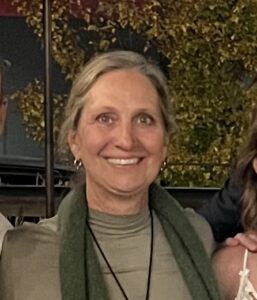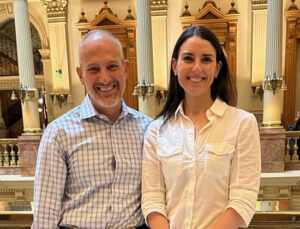Community Story: Grand County Relies on Local Medical Providers & Peer Review
 County Commissioner Rich Cimino represents Grand County, an 1,800-square-mile community with one hospital system, one ambulance service, and one ski resort clinic. There are only two independent doctor’s offices in the county. However, one of them recently announced its closure due to escalating overhead and dramatically increased administrative burden. The economics of health care made operating their independent medical clinic unsustainable.
County Commissioner Rich Cimino represents Grand County, an 1,800-square-mile community with one hospital system, one ambulance service, and one ski resort clinic. There are only two independent doctor’s offices in the county. However, one of them recently announced its closure due to escalating overhead and dramatically increased administrative burden. The economics of health care made operating their independent medical clinic unsustainable.
This will become an increasing trend, particularly in rural Colorado, if proposed ballot measures move forward and make Colorado’s health care environment unstable and untenable for providers. Patients in small communities like Grand County can’t afford to lose more health care services or providers.
The proposed initiatives also threaten “peer review.” Commissioner Cimino saw firsthand the positive impact peer review can have on rural medicine. Several years ago, paramedics and hospital doctors in Grand County had no formal process to resolve misunderstandings or instances of nonconcurrence. However, as a result of strong medical leadership, all providers involved agreed to regularly scheduled peer review meetings which are protected by confidentiality laws. These confidential meetings allow honest and direct conversations about what was good about the medical care and what could be improved upon. Today, the relationship between the local hospital and local ambulance service is better than ever.
Commissioner Cimino was asked by his local hospital CEO and their Chief of Emergency Medical Services to actively support Senate Bill 130, a reasonable alternative that increases the limit on how much an injured patient can collect for non-economic damages while preserving health care access and affordability for all.
“There are times our citizens have to go out of County for health care, but thank goodness we have our hospital,” said Commissioner Cimino. “Things would be much, much worse if our critical access hospital was forced to close due to increased costs as a result of the proposed ballot measures passing.”
Provider Story: Ballot Measures Threaten Access to Reproductive Health Care Services

Dr. Julie Mahoney has been a Colorado resident since 1988. She attended medical school and conducted her training in the state, practicing obstetrics and gynecology for 20+ years in her own practice.
Her passion is – and always has been –ensuring safe access to the full spectrum of reproductive health care services for women, including abortion.
“I am proud that Colorado is a place where women can safely access reproductive health care services and where doctors are supported to practice medicine that is in the best interest of the health and safety of their patients,” said Dr. Mahoney.
However, the practical implications of destabilizing the medical liability environment that would result from the ballot initiatives proposed by trial lawyers would make it more expensive and difficult for OGBYNs like Dr. Mahoney to practice medicine in Colorado. This has a trickle-down effect on patients, making it more difficult and expensive for women to access reproductive health care services.
Senate Bill 130 proposes to make a reasonable and fair adjustment to the non-economic damages cap, while still ensuring a stable medical liability framework that will allow Colorado to retain and attract physicians – including OBGYNs who are unable or unwilling to work in restrictive environments elsewhere.
Patient Story: High-Risk Brain Surgery Saves Lives
 Reverend Ian Cummins, a Presbyterian pastor, Colorado resident and father, had his world turned upside down in March of 2023 when his family learned their 18-year-old son had a tumor buried deep in the middle of his brain.
Reverend Ian Cummins, a Presbyterian pastor, Colorado resident and father, had his world turned upside down in March of 2023 when his family learned their 18-year-old son had a tumor buried deep in the middle of his brain.
Within days of the diagnosis, his son underwent an extremely delicate and difficult surgery. Surgeons told the Cummins family they needed to extract about 80% of the tumor in order for radiation and chemotherapy to even have a chance of working. The surgeon operated for seven hours, with painstaking precision before he paused to do a computerized axial tomography (CAT) scan, believed he could get more, and went back in for three more hours.
Over the next 10 months, Ian’s son underwent radiation and chemotherapy. He received care from countless, skilled medical specialists, nurses and hospital workers. Against all odds, today, Ian’s son has a second chance at life.
“I absolutely understand the need for protections in the case of medical malpractice. As a family in the health care system, I want those protections in place for us, should we ever need them,” said Ian.
“But I also want protections for the medical specialists who saved my son’s life. They perform miracles – a word I don’t use lightly in my business. And if skyrocketing insurance makes it prohibitive for the best-of-the-best to practice in Colorado, or to choose against doing high-risk procedures like we needed, then we’ve made a huge mistake.”
“It seems to me that this is not a debate between protecting doctors OR protecting patients, because protecting doctors IS protecting patients. I believe Senate Bill 130 achieves that.”
Patient Story: Access to Highly Specialized Providers Essential for Patients like Dana

Dana Waldbaum is a working mom of two, an athlete and a Colorado native. She’s also a medical anomaly. In 2013, while in her mid-30’s, she started experiencing acute and extreme pain in her leg that became exacerbated by movement.
She spent the next six months in and out of doctors’ visits trying to determine the cause of her pain. Even with good health insurance and in a city like Denver with many doctors, she was unable to see a specialist in a timely manner. This scenario is an unfortunate reality of our over-burdened and under-staffed health care system.
Eventually, in early 2014, she secured an appointment with Dr. Omar Mubarak in Denver, a highly specialized vascular surgeon at the Vascular Institute of the Rockies. During that initial visit, Dana was diagnosed with an ilio-femoral arterial clot which prevents blood flow to her right leg. The risks of Dana’s condition include heart attack, renal failure, limb loss and even death. This was a shocking diagnosis for an otherwise healthy and active young woman.
Over the last 10 years, Dr. Mubarak has helped Dana carefully navigate her complex medical condition, one that she will have to live with and actively manage for the rest of her life.
“Having a stable medical liability environment is an important part of making Colorado an affordable and attractive place for specialists like Dr. Mubarak to practice medicine,” says Dana. “This topic is critically important to me and to the thousands of Coloradans like me who are living with high-risk medical conditions.”
“Colorado needs highly trained medical specialists to take on complex cases. We need providers who are willing to try new approaches and take risks. Senate Bill 130 is a reasonable approach to increasing the compensation that patients can receive in a medical malpractice lawsuit, while still protecting access to care for Coloradans like me.”